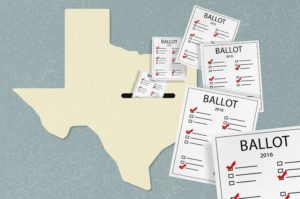A federal judge has stuck it to Texas’s desire to require photo identification for everyone wanting to vote.
She did so with unflinching language. This fight is going to get interesting.
http://www.texastribune.org/2014/10/09/federal-judge-rules-texas-voter-id-law-unconstitut/
The Texas Tribune reports: “’The Court holds that SB 14 creates an unconstitutional burden on the right to vote, has an impermissible discriminatory effect against Hispanics and African-Americans, and was imposed with an unconstitutional discriminatory purpose,’ U.S. District Judge Nelva Gonzales Ramos of Corpus Christi wrote in a 147-page opinion. ‘The Court further holds that SB 14 constitutes an unconstitutional poll tax.’”
Oh yes. Ramos was appointed to the federal bench by President Barack Obama.
Now what? The state has vowed to file an immediate appeal to the Fifth Circuit Court of Appeals. The Fifth Circuit needs to decide quickly if this matter is to be settled in time for the Nov. 4 mid-term election.
I have to hand it to Judge Ramos. She stood tall against voter suppression, which is what voter ID appears to be — to me, at least.
The Texas voter ID law requires voters to produce some form of photo identification when they go to the polls. Opponents of the law enacted in 2011 contend that it discriminates against minority voters who might not have, say, a driver’s license, a passport, a concealed firearm permit or any other valid form of photo ID.
To obtain such identification requires significant expense in some cases, voter ID foes argue, and that comprises what they contend is an unconstitutional “poll tax.”
Across the country where voter ID laws have been in force, the laws are the result of Republican-controlled state governments. That’s not unusual by itself. However, the politics of these laws requires one to wonder out loud: Is this done to suppress the vote among residents who might tend to vote, umm, Democratic?
The alleged bogeyman in this is voter fraud. According to the Texas Tribune: “The state maintains the law ensures the security of the ballots cast by voters and prevents voter fraud. Attorneys for the state argued that there is no evidence the law will keep legitimate voters from voting. Attorneys challenging the law said there is little evidence of the kind of in-person voter fraud the law is intended to prevent.”
Another question: Is voter fraud such a huge matter in Texas that it requires a law such as this?
Instances of voter fraud over the course of many election cycles comprise a minuscule amount.
I’ll leave it to state Sen. Rodney Ellis, D-Houston, to put this matter in what I believe is its proper perspective:
“Texas has a long and sad history of making it difficult for people to vote. Elected officials repeatedly used the law to keep people out of the voting booth. Decades later, history rightly judges those men and women in a harsh light. As the court ruled, the voter ID law is essentially a modern day poll tax and has the same effect as other laws used in decades past to keep scores of lawful, legal Americans from voting. It was wrong then, it is wrong now, and I’m pleased the court stood up to protect the right to vote for all Texans.”
The fight isn’t over. Not by a long shot.

